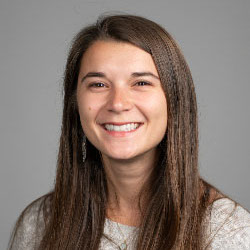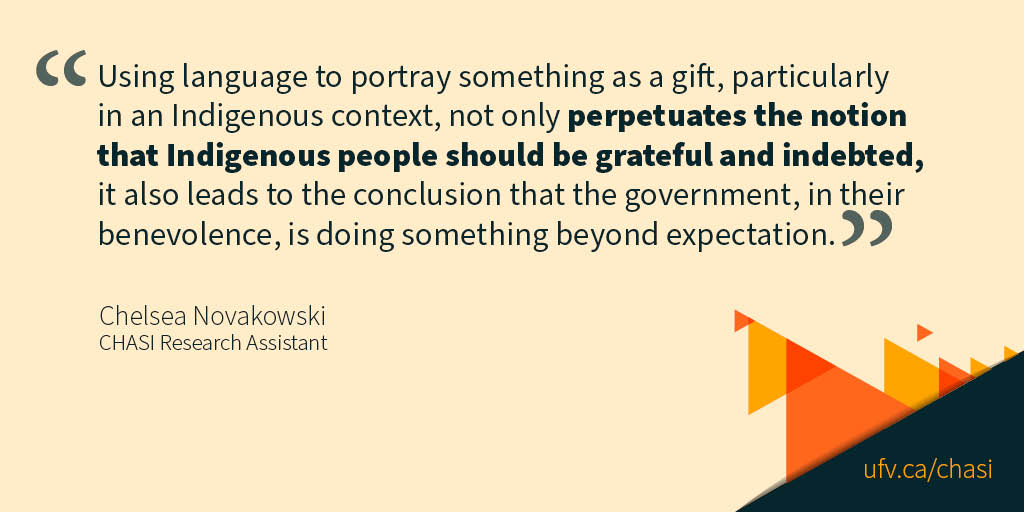 This article by CHASI Research Assistant Chelsea Novakowski is inspired in part by the ongoing observance of International Development Week. In recognition of this week, UFV is also hosting a number of virtual events which are free and open to the everyone.
This article by CHASI Research Assistant Chelsea Novakowski is inspired in part by the ongoing observance of International Development Week. In recognition of this week, UFV is also hosting a number of virtual events which are free and open to the everyone.
This blog post came about because last week, during my class on aid and poverty, we discussed gift theory and how it relates to aid and development. I drew a natural connection between the concepts in my course and the news story below.
Vancouver Coastal Health (VCH) recently apologized to the community of Bella Coola after VCH “failed to provide a culturally safe and respectful experience for Nuxalk Nation members while providing COVID-19 vaccine to vulnerable elders in their remote community.”
Perhaps the root of this failure can be traced to a single concept, a single word: gift.
In an email to the Nuxalk health team, a public health officer used that word, writing that VCH had promised to “gift” doses of COVID-19 vaccine to the Nuxalk Nation. In their very own COVID-19 immunization plan, the Government of BC has established that remote Indigenous communities fall under Phase One as a “high-risk” population for immunization. The life expectancy gap in Canada between Indigenous and non-Indigenous people is 5-7 years, and much of this can be attributed to higher instances of chronic illness. Additionally, remote areas have poorer access to lifesaving medical technology and these factors explain why remote Indigenous communities are a priority population for vaccination.

There’s no doubt that the response to this pandemic in BC has included criticisms due to slow vaccine roll out, major supply issues, and that the pandemic has magnified the shortcomings of bureaucracy.
Language, however, is something more nuanced, and the word choice of “gift” to describe public health inoculations warrants a closer look.
Almost 100 years ago, Mauss (1923) wrote an essay explaining the purpose of a gift. He distinguished gift giving as a unique form of resource allocation, distinct from redistribution or commercial exchange (Mawdsley, 2012).
Gifts create powerful social bonds, and when exchanged between individuals they act to facilitate relationships and respect, create memories and contribute to overall goodwill. Gifts, in the purest form, are to be voluntary, not required or facilitated out of need.
Gifts can be a very powerful social tool.
When you get something unexpected, you feel gratitude.
A public health officer reportedly used the word “gift” in reference to the Nuxalk Nation’s access to the vaccine. While the details and dynamics of the particular situation remain unclear, characterizing a vaccination (which the government has itself mandated as an important feature of COVID containment) as a “gift” is problematic.
By using the word “gift,” the government is expecting people to feel gratitude if they receive the vaccine. Instead, because the government has recognized the urgency at which the Indigenous population should be vaccinated, the absence of the vaccine leads to injustice.
The idea of gift giving can be leveraged by those in power as a way to affirm and entrench social hierarchies over time, creating resentment from the receiver and reinforcing power dynamics. Using language to portray something as a gift, particularly in an Indigenous context, not only perpetuates the notion that Indigenous people should be grateful and indebted, it also leads to the conclusion that the government, in their benevolence, is doing something beyond expectation.
This does not hold up when the very plan that the government has written explicitly puts Indigenous people in a priority position for vaccination.
The problematic concept of the “gift” in this context is bigger than just one public health official. Framing the vaccine as a “gift” shows how the view that the government is benevolent in their action is embedded in society and because of this generosity, Indigenous communities should be grateful. This puts Indigenous communities in a precarious place, because if they request better access or more appropriate distribution, they can be deemed greedy and difficult. This undermines the power and realities of periphery communities and can hide and mask the need for accountability.
I am thankful that we live in a country that is able to offer its citizens preventative medicine and medical expertise. But I consider these pillars of our health care system as more of a mandate of public health authorities rather than charitable offerings.
It is important for those in positions of authority to understand how their language can shape the perception of others’ behavior and thus use that discursive power with a sense of responsibility and humility. Being mindful of how we utilize language, and particularly with reference to underserved communities is imperative to reshaping a more equitable society.
This article is part of CHASI’s ongoing series acknowledging some of the significant annual observances that align with our core values.

